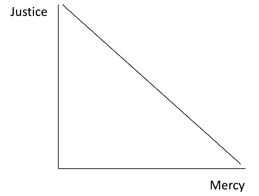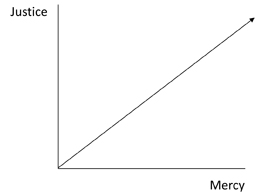When I focused on God’s law as the primary revelation of his will, justice and mercy seemed like oppositional concepts. Justice meant the uniform application of law (punishment mainly) and mercy was an exception to that uniform application. As justice increased mercy decreased. As mercy increased justice decreased (Fig. 1).

Fig. 1
Justice served as a limit on mercy as mercy limited justice. So the righteousness of justice and mercy was a mean between these extremes, because justice was by definition unmerciful, at least in part, and mercy was by definition unjust, at least in part. This made perfect sense to my religious mind, until I read the Bible.
Woe to you, experts in the law and you Pharisees, hypocrites, Jesus said. You give a tenth of mint, dill, and cumin, yet you neglect what is more important in the law – justice (κρίσιν, a form of κρίσις), mercy (ἔλεος), and faithfulness (πίστιν, a form of πίστις)! You should have done these things without neglecting the others.1 Love was added to this list in Luke’s Gospel account: But woe to you Pharisees! You give a tenth of your mint, rue, and every herb, yet you neglect justice (κρίσιν) and love (ἀγάπην, a form of ἀγάπη) for God!2
How could mercy be both an exception to the uniform application of law and, along with justice and faithfulness, more important in the law than tithing mint, dill and cumin? Jesus, it seemed, considered mercy part of the justice of the law rather than a limit upon it. Go and learn what this saying means, He said, quoting Hosea, “I want mercy (ἔλεος) and not sacrifice.” For I did not come to call the righteous, but sinners.3
|
# |
Jesus (NET) |
Blue Letter Bible (Septuagint) |
NET Bible (Greek parallel text) |
|
1 |
I want mercy and not sacrifice
Matthew 9:13 (NET) |
ἔλεος θέλω καὶ οὐ θυσίαν | ἔλεος θέλω καὶ οὐ θυσίαν |
Why does your teacher eat with tax collectors and sinners?4 the Pharisees had asked, revealing their concern over the possibility of defilement.5 When Jesus heard this he said, “Those who are healthy don’t need a physician, but those who are sick do,”6 revealing his concern for the mercy that was an important part of the law. On another occasion Jesus went even further and told the Pharisees, If you had known what this means: “I want mercy (ἔλεος) and not sacrifice,” you would not have condemned the innocent.7 Jesus’ disciples had been gathering grain and eating the grain they had gathered on the Sabbath day. It was about as direct a violation8 of the law of the Sabbath as I can imagine, but Jesus declared them innocent, adding that the Pharisees and I would agree with Him if we understood the mercy that was an important part of the law.
Teacher, what must I do to inherit eternal life?9 an expert in religious law asked Jesus (Luke 10:26-28 NET).
He said to him, “What is written in the law? How do you understand it?” The expert answered, “Love (ἀγαπήσεις, a form of ἀγαπάω) the Lord your God with all your heart, with all your soul, with all your strength, and with all your mind, and love your neighbor as yourself.” Jesus said to him, “You have answered correctly; do this, and you will live.”
The law expert asked for clarification of the term neighbor. Jesus told a story: A man…fell into the hands of robbers, who stripped him, beat him up, and went off, leaving him half dead.10 Two other men passed the robbers’ victim by, but one man felt compassion for him. He went up to him and bandaged his wounds, pouring oil and wine on them. Then he put him on his own animal, brought him to an inn, and took care of him. The next day he took out two silver coins and gave them to the innkeeper, saying, “Take care of him, and whatever else you spend, I will repay you when I come back this way.”11
Jesus asked, “Which of these three do you think became a neighbor to the man who fell into the hands of the robbers?” The expert in religious law said, “The one who showed mercy (ἔλεος) to him.” So Jesus said to him, “Go and do the same.”12 So mercy shown to a stranger defined the term neighbor, and became the justice of the law of loving God and one’s neighbor. Beyond that this was the Gospel message in answer to the question, what must I do to inherit eternal life? Clearly my religious mind was in error.
When Matthew quoted Isaiah his primary focus was on Jesus’ fulfillment of the part of the prophecy that read, He will not quarrel or cry out, nor will anyone hear his voice in the streets.13 Though, Great crowds followed [Jesus], and he healed them all…he sternly warned them not to make him known.14 I am more interested here in the rest of the prophecy: Here is my servant whom I have chosen, the one I love, in whom I take great delight. I will put my Spirit on him, and he will proclaim justice (κρίσιν) to the nations.15 He will not break a bruised reed or extinguish a smoldering wick, until he brings justice (κρίσιν) to victory.16 As I began to recognize Jesus as the primary revelation of God’s will my understanding of justice and mercy began to change.
Justice and mercy are not in opposition but joined like a category I could only call justice-mercy (Fig. 2).
Though justice-mercy may not actually be infinite in its capacity to increase, it is virtually infinite relative to my naive understanding. Probably it should be thought of as justice-mercy-faithfulness-love. But I’m not clever enough to represent that concept graphically.
Addendum (6/24/2015): Jim Searcy has published that the Septuagint is a hoax written by Origen and Eusebius 200 hundred years after Christ. “In fact, the Septuagint ‘quotes’ from the New Testament and not vice versa…” His contention is that the “King James Version is the infallible Word of God.” So, I’ll re-examine the quotations above with the KJV.
|
# |
Jesus (KJV) |
KJV |
NET Bible (Greek parallel text) |
|
1 |
I will have mercy, and not sacrifice | I desired mercy, and not sacrifice | ἔλεος θέλω καὶ οὐ θυσίαν |
The KJV will have and desired, though different tenses, are admittedly closer than the NET: For I delight in faithfulness, not simply in sacrifice (Hosea 6:6a NET) and, I want mercy and not sacrifice (Matthew 9:13 NET). If the present tense delight is incorrect relative to the past tense desired in Hebrew, this could be the first evidence I’ve discovered that the Septuagint quoted the New Testament.
The ASV, NKJV and NIV have desire (present), the DNT has delight (present), the GWT and TEV have want (present), TSMG am after (present), and YLT desired (past). Young’s Literal Translation (YLT) carries some weight with me, but I don’t know any Hebrew to decide this for myself.
1 Matthew 23:23 (NET)
2 Luke 11:42 (NET)
3 Matthew 9:13 (NET)
4 Matthew 9:11 (NET)
6 Matthew 9:12 (NET)
7 Matthew 12:7 (NET)
8 Then the Lord said to Moses, “I am going to rain bread from heaven for you, and the people will go out and gather the amount for each day, so that I may test them. Will they walk in my law or not? On the sixth day they will prepare what they bring in, and it will be twice as much as they gather every other day.” (Exodus 16:4, 5 NET)
9 Luke 10:25 (NET)
10 Luke 10:30 (NET)
11 Luke 10:33-35 (NET)
12 Luke 10:36, 37 (NET)
13 Matthew 12:19 (NET)
14 Matthew 12:15b, 16 (NET)
15 Matthew 12:18 (NET)
16 Matthew 12:20 (NET)


Pingback: Romans, Part 89 | The Gospel and the Religious Mind
Pingback: Christianity, Part 3 | The Gospel and the Religious Mind
Pingback: Funeral, Part 3 | The Gospel and the Religious Mind
Pingback: Funeral, Part 1 | The Gospel and the Religious Mind
Pingback: Who Am I? Part 9 | The Gospel and the Religious Mind
Pingback: A Monotonous Cycle Revisited, Part 2 | The Gospel and the Religious Mind
Pingback: Romans, Part 79 | The Gospel and the Religious Mind
Pingback: Fear – Deuteronomy, Part 2 | The Gospel and the Religious Mind
Pingback: Romans, Part 70 | The Gospel and the Religious Mind
Pingback: Justice, Vengeance and Punishment | The Gospel and the Religious Mind
Pingback: Condemnation or Judgment? – Part 2 | The Gospel and the Religious Mind
Pingback: Romans, Part 44 | The Gospel and the Religious Mind
Pingback: Fear – Exodus, Part 1 | The Gospel and the Religious Mind
Pingback: Religious and Righteous Prayer | The Gospel and the Religious Mind